|
familiedocumenten/family
documents p.5
|
| family main page| name page | documents | pedigrees | photo galleries | sitemap | family news |
Hetty
Winkel page 1. letter Max Oct. 28 1945 page 1a. letter Max Nov. 19/20 1945 page 1b. letters Max December 1945 page 2. letter Ies and Lien Cassuto 1945 page 3. report Puck Cassuto about Pacific war page 3a.first letter Puck Cassuto + Albert v. Zuiden after Pacific war page 4. George Cassuto Izn.: his memories of WW II, till hiding page 4a. George Cassuto Izn.: his memories of WW II, first time in hiding page 4b. George Cassuto Izn.: his memories of WW II, 1943 and 1944 page 4c. George Cassuto Izn.: his memories of WW II, liberation and aftermath page 4d. George Cassuto Izn.: his memories of WW II, impact on later life page 5. Hetty Winkel |
||||||
| Hetty
Winkel is the daughter of Jaap Winkel - brother of Caroline Winkel - and
Esther Querido. Caroline (Lien) Winkel was wife to Isaac (Ies) Cassuto. View Hetty's place in the pedigree. Hetty was born around 1920 and got engaged at the end of the thirties to Ernest Cassuto, second son of Ies and Lien, her cousin. During the war she was in hiding, a short period together with Ernest and then alone. She was betrayed during the summer of 1943 by a collaborator to the Germans and transported to the death camps, where she perished presumably in 1943. The same fate befell her mother Esther and her little brother Andries (Dee). Latest information about Hetty's death from George Cassutto Ezn: Hetty Winkel, we thought she had died in Auschwitz, but documentation showed that she was gassed in Chelmno, another one of the extermination camps. |
||||||
|
|
||||||
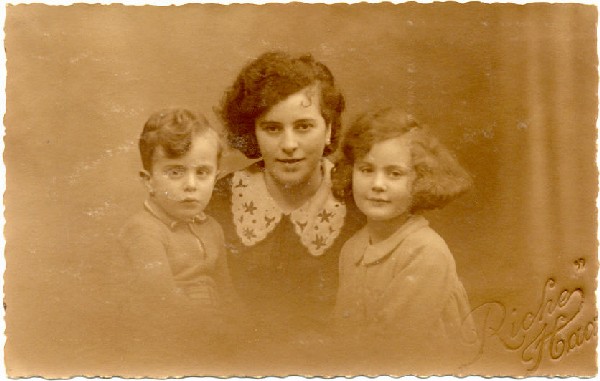 The same three, December 1, 1929 |
||||||
|
|
||||||
|
From left to right: Dee, Jaap, Esther and Hetty, all waving to us from behind the time wall of the 5 years of world war II. The date
is Sunday July 10, 1932
|
||||||
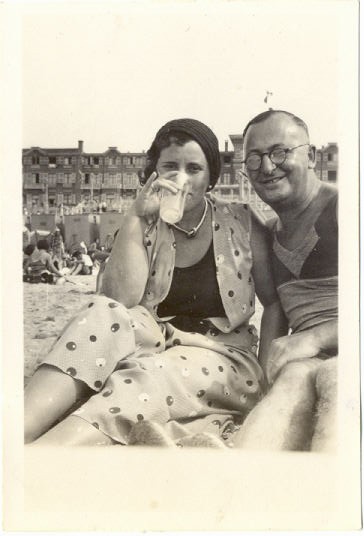 relaxed
picture of parents Esther and Jaap at the Scheveningen beach, August 1932 relaxed
picture of parents Esther and Jaap at the Scheveningen beach, August 1932 |
||||||
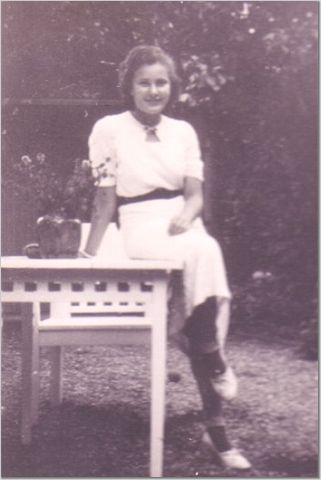 Hetty,
not dated. Hetty,
not dated.I estimate she's about sixteen here. |
||||||
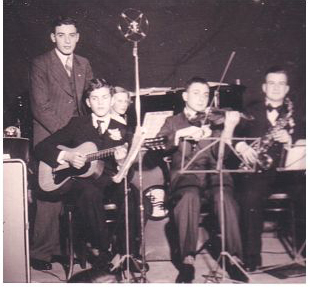 The
band of Ernest. Ernest is at the right with saxophone. Hetty used to sing
with the band The
band of Ernest. Ernest is at the right with saxophone. Hetty used to sing
with the band |
||||||
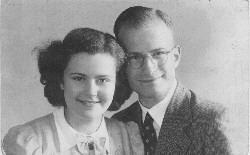 so
called engagement picture of Ernest and Hetty. so
called engagement picture of Ernest and Hetty.1940/1941? |
||||||
| This is the
first page of the diary kept by Hetty in hiding. It is a very religious
booklet, a sad witness of her hopes and faith and the bond she felt in this
frightful period with Ernest. It consists of prayers and contemplations
about passages from the Scriptures. On this first page is written: Aan mijn eigen trouwe levenskameraad in Jezus Christus "De Heere zegene en behoede je. De Heere doe Zijn aangezicht over je lichten en zij je genadig. De Heere verheffe zijn aangezicht over je en geve je Zijn vrede" English: To my own true comrade in life. "The Lord bless thee, and keep thee; The Lord make His face shine upon thee, and be gracious unto thee; The Lord lift up his countenance upon thee, and give thee His peace" (some unreadable words, perhaps something like "Altijd de jouwe", for ever yours) It is the so called "blessing of the priest" (birkat kohanim), mentioned in Numbers 6 24-27, in which G-d tells Moses that whith these words the priests shall bless the children of Israel. I remember that the "dominee" (minister) always ended the Protestant service with this blessing, his hands raised. Now, in shul, I hear the blessing sung by the 'chazzan'(cantor) in Hebrew as a part of the morning prayer, called "Shemoneh Esreh" or "Amida". The poetic and powerful words still touch the heart. 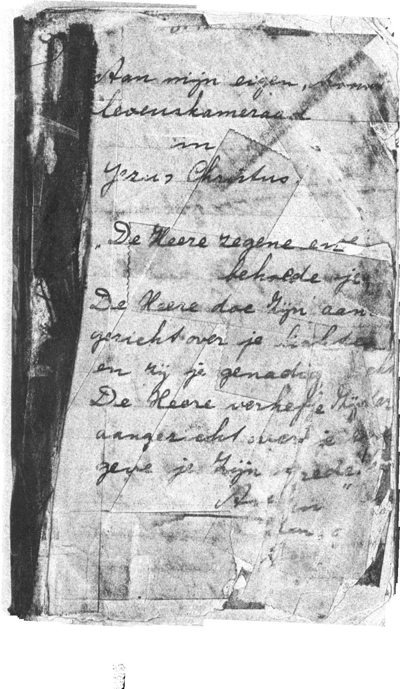 from
Ernest Cassutto's book from
Ernest Cassutto's book"The last Jew of Rotterdam": I had lived through four seasons in hiding. As the summer of 1943 approached, I began to lose count of the number of places where I had sought shelter. It is amazing how quickly one can adapt to circumstances. I hardly remembered a time when I was not on the run. I began to feel like an expert; it was almost as if I had mastered the game. If I could just keep two steps ahead of the Gestapo, perhaps I would make it. I spent much of my time studying Hebrew and the Bible. I frequently talked to God. I prayed for safety, for the safety of my parents, my brothers and Hetty. Hetty and I were occasionally able to pass messages to each other through the help of our friends in the underground. One day in spring, I received a package from her. It was her personal diary and her New Testament. She wanted me to see what had taken place in her mind and heart during our separation. In the back of the diary were penned these words.: "Ernest, we must pray for the Germans. They need our prayers so bad1y" (....) Usually around once a week, I would receive news about the war from an underground worker who would call on people in hiding. One early summer day, while I was hiding in the home of a Salvation Army officer in The Hague, my informant showed up earlier than usual. "Ernie, I have same bad news. Hetty has been arrested." from the interview with Ernest younger brother George: English summary: he relates that she was in hiding with a family in The Hague; a friend of the family was a collaborator to the Nazi's, which they didn't know at the time. Hetty played the role of a non-jewish maid servant. The "friend" suspected she was Jewish and informed the Germans. She was transported to Westerbork and from there to Polen. Georges remembers they heard the message from underground workers and he recalls how shocked they were. Much later they learned that also mother Esther and brother Deetje also had perished. Father Jaap had already passed away before the war. Dutch: Ik herinner me in juli 1943, toen kwamen ze met het bericht van de arrestatie van mijn nichtje, die verloofd was met mijn broer en ook ondergedoken zat, net als hij. Zij zat ondergedoken in Den Haag bij een gezin waar een huisvriend een NSB-er bleek te zijn, dat wisten ze dus toen nog niet. Ze speelde daar een niet-joodse rol, ze was een soort van dienstmeisje. De huisvriend verdacht haar ervan dat ze joods was. Die heeft de NSB-ers, de Duitsers of zo gewaarschuwd en toen is mijn nichtje opgepakt, Hetty Winkel heete ze. Ze werd via Rotterdam naar Westerbork gestuurd. En dat bericht kwam bij mijn ouders binnen via de ondergrondse, dat herinner ik me heel duidelijk, dat ze dat kwamen vertellen, Leny Visser in dit geval, en dat het een vreselijke schok was voor ons allemaal. Interviewer: Dat was voor het eerst dat er iemand gedeporteerd was? Ja, dat wij dat hoorden, want de deportaties van de andere familieleden hebben wij pas later vernomen. Die waren dus te lang thuis gebleven, zijn na ons respectievelijk ondergedoken en verraden of gewoon van huis uit opgepakt met de razzia's. Maar de eerste die waarvan we iets wisten, was ons nichtje. Later hoorden we dat haar moeder - haar vader was, gelukkig zou je bijna zeggen, nog voor alles overleden - dat haar moeder, Ester Winkel-Querido, haar broer, en haar zoon ook zijn verraden, in de Raadhuisstraat en die hebben dus hun dochter en zusje in Westerbork teruggevonden en ze zijn dus alle drie omgekomen. Maar dat is een van de dingen uit dat jaar bij Spelbos die ik als de dag van gisteren nog voor ogen heb. 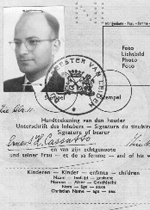 read also the story of Ernest Cassutto on the Cassutto Memorial pages by his son George; click on the picture left. |
||||||
back to documents survey page back to the family messages back to the family main page |
||||||
|
||||||